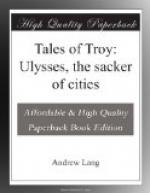When Helen heard that her husband was to fight Paris, she wept, and threw a shining veil over her head, and with her two bower maidens went to the roof of the gate tower, where king Priam was sitting with the old Trojan chiefs. They saw her and said that it was small blame to fight for so beautiful a lady, and Priam called her “dear child,” and said, “I do not blame you, I blame the Gods who brought about this war.” But Helen said that she wished she had died before she left her little daughter and her husband, and her home: “Alas! shameless me!” Then she told Priam the names of the chief Greek warriors, and of Ulysses, who was shorter by a head than Agamemnon, but broader in chest and shoulders. She wondered that she could not see her own two brothers, Castor and Polydeuces, and thought that they kept aloof in shame for her sin; but the green grass covered their graves, for they had both died in battle, far away in Lacedaemon, their own country.
Then the lambs were sacrificed, and the oaths were taken, and Paris put on his brother’s armour, helmet, breastplate, shield, and leg-armour. Lots were drawn to decide whether Paris or Menelaus should throw his spear first, and, as Paris won, he threw his spear, but the point was blunted against the shield of Menelaus. But when Menelaus threw his spear it went clean through the shield of Paris, and through the side of his breastplate, but only grazed his robe. Menelaus drew his sword, and rushed in, and smote at the crest of the helmet of Paris, but his bronze blade broke into four pieces. Menelaus caught Paris by the horsehair crest of his helmet, and dragged him towards the Greeks, but the chin-strap broke, and Menelaus turning round threw the helmet into the ranks of the Greeks. But when Menelaus looked again for Paris, with a spear in his hand, he could see him nowhere! The Greeks believed that the beautiful goddess Aphrodite, whom the Romans called Venus, hid him in a thick cloud of darkness and carried him to his own house, where Helen of the fair hands found him and said to him, “Would that thou hadst perished, conquered by that great warrior who was my lord! Go forth again and challenge him to fight thee face to face.” But Paris had no more desire to fight, and the Goddess threatened Helen, and compelled her to remain with him in Troy, coward as he had proved himself. Yet on other days Paris fought well; it seems that he was afraid of Menelaus because, in his heart, he was ashamed of himself.
Meanwhile Menelaus was seeking for Paris everywhere, and the Trojans, who hated him, would have shown his hiding place. But they knew not where he was, and the Greeks claimed the victory, and thought that, as Paris had the worst of the fight, Helen would be restored to them, and they would all sail home.




